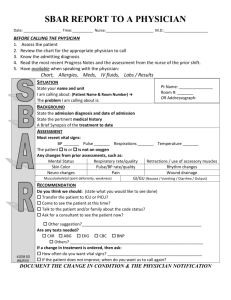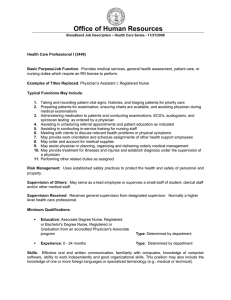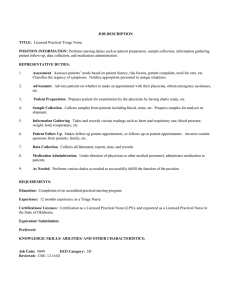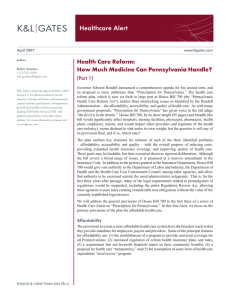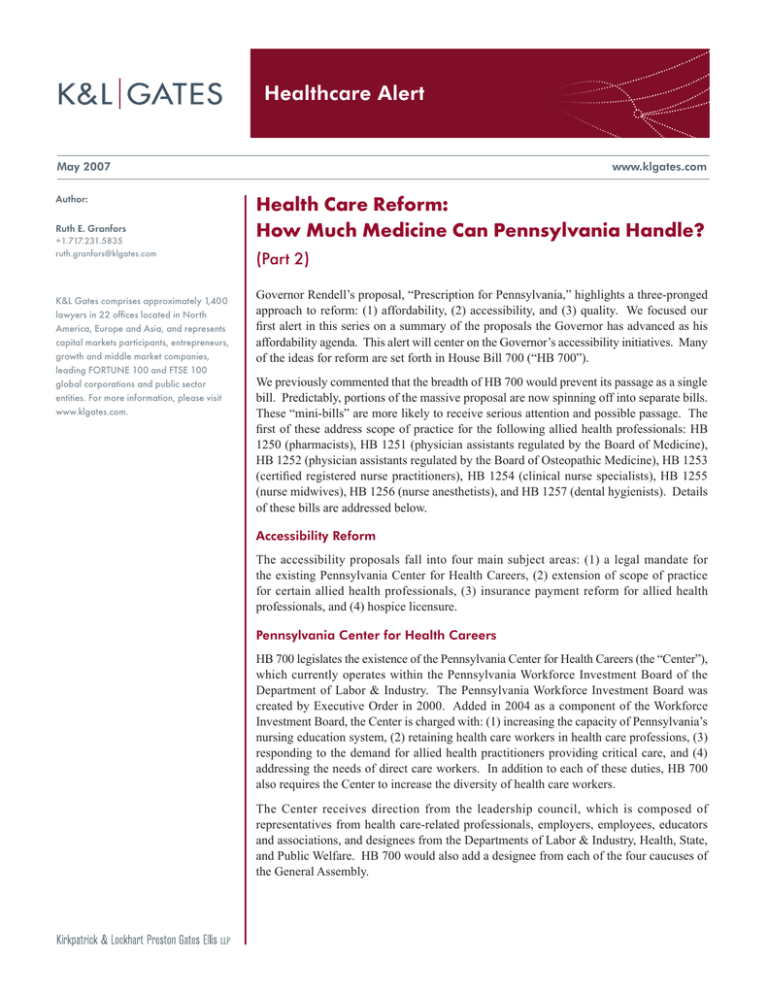
Healthcare Alert
May 2007
Author:
Ruth E. Granfors
+1.717.231.5835
ruth.granfors@klgates.com
K&L Gates comprises approximately 1,400
lawyers in 22 offices located in North
America, Europe and Asia, and represents
capital markets participants, entrepreneurs,
growth and middle market companies,
leading FORTUNE 100 and FTSE 100
global corporations and public sector
entities. For more information, please visit
www.klgates.com.
www.klgates.com
Health Care Reform:
How Much Medicine Can Pennsylvania Handle?
(Part 2)
Governor Rendell’s proposal, “Prescription for Pennsylvania,” highlights a three-pronged
approach to reform: (1) affordability, (2) accessibility, and (3) quality. We focused our
first alert in this series on a summary of the proposals the Governor has advanced as his
affordability agenda. This alert will center on the Governor’s accessibility initiatives. Many
of the ideas for reform are set forth in House Bill 700 (“HB 700”).
We previously commented that the breadth of HB 700 would prevent its passage as a single
bill. Predictably, portions of the massive proposal are now spinning off into separate bills.
These “mini-bills” are more likely to receive serious attention and possible passage. The
first of these address scope of practice for the following allied health professionals: HB
1250 (pharmacists), HB 1251 (physician assistants regulated by the Board of Medicine),
HB 1252 (physician assistants regulated by the Board of Osteopathic Medicine), HB 1253
(certified registered nurse practitioners), HB 1254 (clinical nurse specialists), HB 1255
(nurse midwives), HB 1256 (nurse anesthetists), and HB 1257 (dental hygienists). Details
of these bills are addressed below. Accessibility Reform
The accessibility proposals fall into four main subject areas: (1) a legal mandate for
the existing Pennsylvania Center for Health Careers, (2) extension of scope of practice
for certain allied health professionals, (3) insurance payment reform for allied health
professionals, and (4) hospice licensure.
Pennsylvania Center for Health Careers
HB 700 legislates the existence of the Pennsylvania Center for Health Careers (the “Center”),
which currently operates within the Pennsylvania Workforce Investment Board of the
Department of Labor & Industry. The Pennsylvania Workforce Investment Board was
created by Executive Order in 2000. Added in 2004 as a component of the Workforce
Investment Board, the Center is charged with: (1) increasing the capacity of Pennsylvania’s
nursing education system, (2) retaining health care workers in health care professions, (3)
responding to the demand for allied health practitioners providing critical care, and (4)
addressing the needs of direct care workers. In addition to each of these duties, HB 700
also requires the Center to increase the diversity of health care workers.
The Center receives direction from the leadership council, which is composed of
representatives from health care-related professionals, employers, employees, educators
and associations, and designees from the Departments of Labor & Industry, Health, State,
and Public Welfare. HB 700 would also add a designee from each of the four caucuses of
the General Assembly.
Healthcare Alert
Professional Practice of Allied Health
Practitioners
collaborative agreement or for whom the doctor may
have primary responsibility.
HB 700 generally purports to expand the scope of
professional practice for allied health professionals
working in physician offices, clinics and other outpatient
settings, through the initial broad principle set forth in
section 7303. Inpatient hospital settings are specifically
exempted from this general rule. The rule states that
any law using the terms “physician,” “medical doctor,”
“doctor of osteopathy” or “dentist,” in connection with
the authority to perform medical histories, physical or
mental health examinations, or “acute illness, minor
injury or chronic disease management care,” also
must be interpreted to permit the performance of such
activities by certified registered nurse practitioners
(“CRNPs”), clinical nurse specialists, physician
assistants, nurse midwives and independent dental
hygienists. The limitation is that these activities must
“fall within the individual’s specialty certification and
scope of practice as determined by the applicable State
licensing board.” Thus, the language of the bill does
nothing to change the existing scope of practice. At
most, it attempts to eliminate barriers in interpretation
and implementation of existing law, which rests solely
within the authority of the respective professional
boards.
HB 1253 also would lift the restriction on the number
of collaborative agreements a physician may have with
a CRNP with prescriptive authority. In addition, the
CRNP bill would provide greater prescriptive authority
to CRNPs, including Schedule II through V drugs.
Lastly, HB 1253 would recognize specific activities
as within the scope of practice of a CRNP, such as
ordering home health and hospice care, ordering
durable medical equipment, ordering respiratory
and occupational therapy, performing and signing
methadone treatment evaluations, and authorizing
commitments under the Mental Health Procedures
Act.
Despite the circular language of HB 700’s general
principle, other provisions of the bill would expand
existing law. These scope of practice provisions are
now in separate bills. For example, a current provision
of the Pharmacy Act permits a pharmacist to manage
drug therapy under a written agreement or protocol
with a physician “in an institutional setting.” HB 1250
seeks to expand that ability by defining an “institutional
setting” to include, among other things, physician
group practice settings. This clarification would only
raise more questions, i.e., how is a physician group
practice “an institutional setting”? If the intent of HB
1250 is to expand the pharmacist’s ability to manage
drug therapy in all settings, inpatient or outpatient,
residential or not, the proposal could simply delete the
existing reference to “institutional setting.”
HB 1251 and HB 1252, amending provisions for
physician assistants, are also offshoots of HB 700.
These bills would remove the limit on the number of
physician assistants, currently set at two, that a medical
doctor or doctor of osteopathy may supervise under a
Another bill, HB 1254, would amend the Professional
Nursing Law to recognize a category of professional
known as the “clinical nurse specialist” or “CNS.” The
Board of Nursing would have authority to approve
educational programs for CNS certification and to
establish qualifications for becoming a CNS. The
Board would be required to establish regulations to
implement these amendments within eighteen months
of the act’s effective date. The “practice of a clinical
nurse specialist” is defined as “the provision of direct
and indirect nursing care at the advanced level.”
Similarly, HB 1256 would amend The Professional
Nursing Law to create a certification program for nurse
anesthetists. A certified registered nurse anesthetist
(“CRNA”) functioning in this capacity at the time of
passage of this proposal would be permitted to continue
practicing. It is unclear whether the practicing CRNA
must also obtain certification under the proposal or
is effectively “grandfathered” for life, but it appears
that eventually would be required. HB 1256 would
obligate the CRNA to practice in collaboration with
a physician or dentist. The bill further clarifies that
if the “operating or anesthesia team consists entirely
of nonphysicians, an anesthesiologist or consulting
physician of the [CRNA’s] choice shall be available
to the [CRNA] by physical presence or electronic
communication.” The Board is required to establish
regulations to implement the CRNA amendments
within eighteen months of the effective date.
HB 1255 would amend the Medical Practice Act to
provide specific authorization to nurse midwives to
provide primary care services to pregnant women, to
May 2007 | Healthcare Alert
manage childbirth and to provide office gynecological
care and family planning. It also would expand the
nurse midwife’s practice to allow prescriptive authority
for Schedule II through V drugs when the individual
meets certain training, education and certification
requirements and has a collaborative agreement with
a physician that outlines the limits of this prescriptive
authority. Nurse midwives would also be allowed
to order, dispense and administer medical devices,
immunizing agents and “therapeutic, diagnostic and
preventative measures.”
The eighth “mini-bill,” HB 1257, amends The Dental
Law to recognize expanded scope of practice for
dental hygienists who are certified as independent
dental hygiene practitioners. These independent dental
hygiene practitioners would be permitted to practice
without the supervision of a dentist in the following
settings: (1) schools, (2) correctional facilities, (3)
health care facilities, (4) personal care homes, (5)
domiciliary care facilities, (6) older adult daily living
centers, (7) continuing care retirement communities,
(8) any institution under the jurisdiction of a federal,
state or local agency, (9) day care programs, (10) head
start programs and (11) free clinics. The practice of
the independent dental hygiene practitioners would
include all activities that a dental hygienist may
perform, and also the ordering and administering of
fluoride treatments and products and order dental
equipment. The scope of practice of a dental hygienist,
who must practice under a dentist’s supervision, would
be extended to include, among other things, radiologic
procedures, soft tissue curettage and filling of teeth.
Each of these bills is intended to improve access to
medical and dental care, by increasing the number of
individuals who legally may provide basic preventive
and therapeutic services. As separate bills, each
proposal could be considered on its own merit. For
now, these bills are the subject of various hearings
throughout the state before the House Professional
Licensure Committee.
Allied Health Professionals and Payment
Extending the scope of practice of the allied health
professionals may have little effect unless health
insurers reimburse for these services when performed
by these providers. Each payor, including Medicare and
Medicaid, sets their own policies for reimbursement,
which do not always match licensing requirements.
These payment reforms do not apply to Medicare,
Medicaid or other government health insurance
programs.
HB 700 would require health insurers to: (1) include
CRNPs, physician assistants, clinical nurse specialists
in primary care, and nurse midwives as primary care
practitioners (“PCPs”) for managed care plans, (2) pay
these PCPs directly unless they specify otherwise, and
(3) establish payment procedures and policies that not
only recognize this PCP designation, but also provide
incentives for “expanded primary care availability,”
e.g., during evenings and weekends.
These provisions provide support to the rapidly
developing convenient care clinic model, found in retail
establishments such as drug stores and grocery stores,
as well as recognition to nurse-managed clinics, urgent
care clinics, and federally qualified health centers. HB
700 would require plans to recognize these settings for
primary care and include them in their networks “if
they are geographically available to provide services to
the insurer’s covered members.” However, these clinics
would still need to meet credentialing requirements,
and HB 700 calls for the Department of Health to
approve such credentialing procedures. The Insurance
Department could from time to time modify the list of
primary care providers by publishing a notice in the
Pennsylvania Bulletin.
Insurers also would be responsible for “timely”
payment to health care providers “at rates sufficient to
assure the availability of and access to adequate health
care providers.” In setting these rates, the insurer could
take into account “the need for fiscal restraints.” Given
the vague parameters of these payment mandates and
no designation of an agency to administer, interpret or
enforce them, these provisions would likely provide
substantial work for trial lawyers and courts, as
providers and payors wrestle with defining sufficiency
of rates, limited by fiscal boundaries. As evidenced by
litigation involving the adequacy of Medical Assistance
rates and disputes over payment for emergency services
by non-participating providers, legislation has never
been adequate on its own to define fair reimbursement
rates.
May 2007 | Healthcare Alert
In addition to these payment provisions, health
insurers would have additional mandates with respect
to behavioral health. Insurers would not be permitted
to exclude: (1) from coverage, minor children with
behavioral conditions, or (2) from covered services,
behavioral therapy services for minor children. The
term “behavioral conditions” is not defined, nor is the
term “behavioral therapy services.” There is no clear
authority given to the Insurance Department or another
agency to define those terms or enforce this provision.
In the general definitions section, the term “behavioral
health services” is defined simply as “[m]ental health
or substance abuse services.”
safety. First, it requires the Department to promulgate
proposed and then final regulations for residential
hospices, within 180 days and 270 days, respectively.
These regulations must address small (less than 23
beds) residential hospices and children’s hospices.
Second, it requires the promulgation of an alternative to
the Fire and Safety Code standards used for Medicare
certification for small residential hospices.
Hospice Licensure
Questions about health care reform in Pennsylvania,
and how you can get involved, may be directed to:
HB 700 calls for the promulgation of regulations to
license residential hospice facilities. The Health Care
Facilities Act (the “Facilities Act”) has required the
Department of Health to license hospices since 1999,
and has mandated the promulgation of regulations for
licensure. Under the Facilities Act, the regulations
are required, at a minimum, to meet the standards
for certification of a hospice under Medicare. The
Department has not developed regulations for licensure
of hospices. The Facilities Act states that until final
regulations are adopted, the Department shall license
hospices “pursuant to interim guidelines,” and the
Department has done just that. The Department
licenses hospices under interim guidelines that adopt
the standards for Medicare certification of these
providers.
HB 700 seeks to cure issues related, in particular, to
small residential hospices that have difficulty meeting
certain Medicare standards for physical plant and fire
More information about “Prescription for Pennsylvania”
can be found on the Governor’s Office of Health Care
Reform website: www.rxforpa.com. House Bill 700
and spin-off bills can be found at: http://www.legis.
state.pa.us/.
Public Law and Policy Practice:
Peter A. Gleason 717.231.2892
peter.gleason@klgates.com
Raymond P. Pepe 717.231.5988
raymond.pepe@klgates.com
James D. Welty 717.231.5878
jim.welty@klgates.com
Health Care Practice:
Ruth E. Granfors 717.231.5835
ruth.granfors@klgates.com
Patricia C. Shea 717.231.5870
patricia.shea@klgates.com
Edward V. Weisgerber 412.355.8980
ed.weisgerber@klgates.com
K&L Gates comprises multiple affiliated partnerships: a limited liability partnership with the full name Kirkpatrick & Lockhart Preston Gates Ellis LLP qualified in
Delaware and maintaining offices throughout the U.S., in Berlin, and in Beijing (Kirkpatrick & Lockhart Preston Gates Ellis LLP Beijing Representative Office); a
limited liability partnership (also named Kirkpatrick & Lockhart Preston Gates Ellis LLP) incorporated in England and maintaining our London office; a Taiwan
general partnership (Kirkpatrick & Lockhart Preston Gates Ellis) which practices from our Taipei office; and a Hong Kong general partnership (Kirkpatrick &
Lockhart Preston Gates Ellis, Solicitors) which practices from our Hong Kong office. K&L Gates maintains appropriate registrations in the jurisdictions in which
its offices are located. A list of the partners in each entity is available for inspection at any K&L Gates office.
This publication/newsletter is for informational purposes and does not contain or convey legal advice. The information herein should not be used or relied
upon in regard to any particular facts or circumstances without first consulting a lawyer.
Data Protection Act 1998—We may contact you from time to time with information on Kirkpatrick & Lockhart Preston Gates Ellis LLP seminars and with our
regular newsletters, which may be of interest to you. We will not provide your details to any third parties. Please e-mail london@klgates.com if you would prefer
not to receive this information.
©1996-2007 Kirkpatrick & Lockhart Preston Gates Ellis LLP. All Rights Reserved.
May 2007 |


